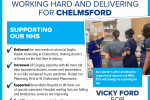
This week was “Parliament Week” when schools and other organisations for young people like Brownie and Scout packs hold events to learn about Parliament. With democracy under threat in so many parts of the world, this is a useful opportunity to learn about our parliamentary system. Those taking part can access a wide range of different resources, tailored to various age groups and raise issues that are a concern to our children and young people. I started the week at Great Baddow High School where the Year 12 and 13 students were holding mock elections.
In Parliament this week the main news was the Autumn Statement which was given by the Chancellor on Thursday. This is a very challenging time economically, not only for the UK but in many countries across the world. The cost of supporting people during the pandemic has added significantly to our public debt. Putin’s war in Ukraine has caused wholesale gas and electricity costs to rise to eight times their historic levels. It is very important to get a grip on inflation and bring fiscal stability so that interest rates can also stabilise. Unfortunately, this means that we are all going to need to pay more tax to maintain public services.
However, I was glad that people on lowest incomes were protected with the Triple Lock maintained and benefits rising in line with inflation. The Chancellor also committed to additional efforts to encourage those that are not working into jobs and tackling fraud. The NHS and Schools will receive additional funding which is important to tackle social care issues and to make sure our children and young people have the skills they need for the future.
Significant investment was also announced in projects to help build our own energy security, including a new nuclear power station at Sizewell in Suffolk. Infrastructure and Research spending was also maintained, this is important for our future growth. Too often the UK is the home of great innovation, but the production of the innovative products then happens overseas. Changes were announced to help the advanced manufacturing sector so that more production happens here.
In the House of Commons, I raised the issue of spiking. I usually hear very positive comments about Chelmsford bars, pubs and clubs but I was concerned to receive a flurry of comments by email and online about potential spiking incidents.
I also visited Popworld in Chelmsford with police officers to learn about how they are working to keep people safe. Every Friday and Saturday night, a welfare officer is present every Friday and Saturday night for people who need help as well as ten door staff, of whom at least one is always a woman. They have glass and bottle covers to prevent drink spiking, will recharge phones, walk women to the taxi rank and give free water to anyone who asks. Regular training is provided to all staff and a save room is available for anyone who needs it. Over forty CCTV cameras monitor the club so that any incidents can be investigated. Random licencing checks are carried out regularly.
I was impressed by the thought and care of the staff. However, if you think you have been a victim of spiking, please do report it to the police promptly. This is important as a urine samples need to be given within 24 hours. Both the police and our city’s pub staff do want to make sure that if there are incidents then any perpetrators can be caught and held to account.
In Westminster, I met with the Minister for Mental Health to discuss mental health provision in Essex and took in a debate about childcare. I also raised questions about Russia’s war with Ukraine. Putin is using military weapons to target the country’s infrastructure. He aims to force innocent civilians to freeze and starve this winter. I urged the government to continue to support the people of Ukraine. The regime in Iran is also acting despicably. Teenage girls have been shot with live ammunition, others have been arrested, forced into marriage and raped. The UK is working to expel Iran from the UN Convention on the Status of Women. I urged the Government to continue to use all diplomatic and sanctions tools to support the women and girls of Iran.
The UK has just made a significant donation to the Global Fund, which works with developing nations to combat diseases like Malaria, TB and HIV. The Fund also works to strengthen health systems across the world. The pandemic reminded us that diseases do not recognise borders so it is extremely important for our own health security that other countries can also identify outbreaks of disease early and act. I met with representatives of the One Campaign who work with volunteers across the UK to raise awareness.
In Chelmsford, I also met with officials from the Environment Agency and Chelmsford City Council about plans to improve our flood resilience. I have been pressing for an improvement in Chelmsford flood defences for as long as I have been the MP. Prolonged heavy rainfall on the upper reaches of the Rivers Chelmer, Wid and Can at the same time could lead to significant flooding. Fortunately, this has not happened in recent decades, but it is now a real risk. At the meeting we were showed how advanced computer modelling means it is now possible to take a holistic view of how several different interventions would work together to reduce the risk of flooding. I am urging both the City Council and the Environment Agency to work faster.
I met with the project leads for Beaulieu Station. This project making good progress. It is likely that the construction contract will be signed very shortly. I also joined other MPs to meet with representatives from our local NHS. Cancer waiting lists are falling which is extremely good news. They are also working on a number of different initiatives to help support people at home for those that do not need to be in hospital. However, this winter will bring extra pressure, so please, if you are eligible for a covid of flu vaccine do pop along and get one as soon as possible.



